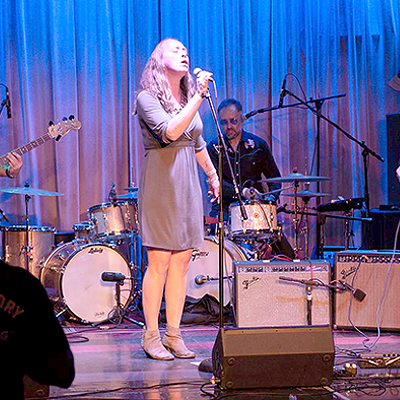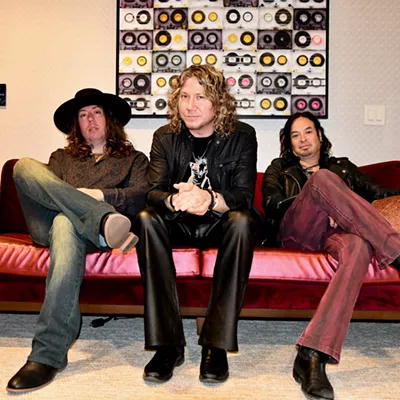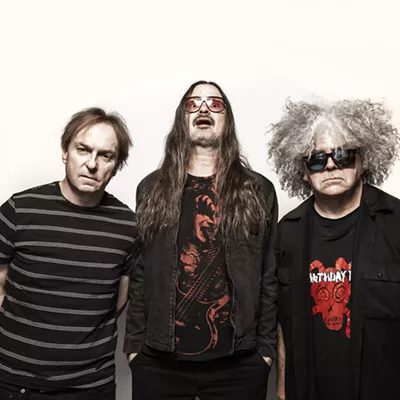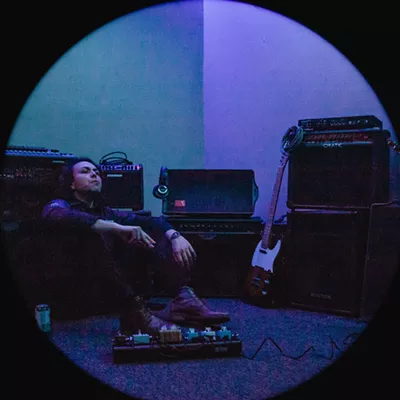In a show billed as Tucson's first Nordic concert, the Swedish trio Frifot (pronounced "free-fut") performs this Sunday at the International Arts Center. The acoustic Frifot tends to the more traditional end of the contemporary spectrum, as opposed to bands such as Sorten Mud, a Danish group that mixes gory medieval lyrics with techno tracks, or Swedish folk-grungers Hoven Droven.
Frifot's multi-talented members have played a leading role in popularizing their country's music beyond the frozen tundras. Per Gudmundson plays various fiddles and Swedish bagpipes, while Lena Willemark supplements her vocals with additional fiddles and flutes. Ale Möller plays mandola, flutes, hammered dulcimer, folk harp and shawm (a Renaissance-era forerunner of the oboe). Gudmundson and Möller also contribute vocals, lending tight, exotic harmonies to the trio's a cappella songs.
Despite the relative rarity of Nordic music in America, Frifot is touring in support of two current albums on two different labels. Last year, Northside, a Minneapolis-based promulgator of the genre, released Summersong, a compilation featuring tracks from Frifot's self-titled 1991 release and the 1996 album Järven, both originally on Sweden's Caprice imprint.
Nineteen-ninety-nine also saw the release of the band's first collaboration with ECM, a German label best known for owner/producer Manfred Eicher's eclectic stable of musicians, ranging from avant-garde world jazz artists to Estonian minimalist composer Arvo Pärt, who had a peripheral role in introducing Eicher to Frifot. While Eicher was visiting Sweden for the premier of Pärt's "Silouan Song," the two stopped at a folk festival and stumbled onto Frifot's set. Eicher produced the new album, also titled Frifot, adding his spacious and atmospheric sound to the band's songs. The tunes range from trad, such as a Swedish cattle herding song ("Tjugmyren"), to originals by each of the members.
In addition to the exceptional vocal range and control exhibited by Willemark, Frifot achieves its signature sound by adding a twist to the members' musical influences. Initially, Möller was a trumpet player who wanted to be a jazz musician. He switched to the Greek bouzouki along the way, mastering it well enough to spend three years in Greece playing in an orchestra that was occasionally joined by composer Mikis Theodorakis.
Returning to his frosty roots, Möller looked for a string instrument to mimic the nuances of Scandinavian fiddle playing. When his search left him empty-handed, he devised a custom mandola with added frets to handle the required microtonal subtleties. "Folk music isn't much interested in borders on maps drawn by politicians and generals. Influences creep in, even in traditional music," Möller has said.
The group's resident scholar, Gudmundson has been instrumental in rekindling interest in the Swedish bagpipe tradition. As in Celtic music, the drone of bagpipes and the tonal range of fiddles are particularly suited to each other. However, far from being tradition-bound, Frifot adds notes that sometimes give the music a Central European Gypsy feel, and at other times lend a seemingly Arabic flavor.
Willemark grew up singing amid the rural folk culture of mid-West Sweden. As a girl, she learned kulning, an ancient tradition of high-pitched, pinched-throat sounds used by women to call cattle and to communicate over miles of mountains. She later studied voice at the Stockholm Conservatory, where her focus was jazz.
With music ranging from plaintive paeans to country living to complex and frenzied fiddle breakdowns, Frifot gives local lovers of world music an opportunity to travel beyond Celtic to more adventurous Nordic climes.
Frifot performs at 7:30 p.m. Sunday, April 16, at the International Arts Center, 516 N. Fifth Avenue. Tickets are available for $12 in advance, $10 for In Concert! members, at Hear's Music, the Folk Shop and Antigone Books. Tickets cost $12 and $14 at the door. For information and reservations, call In Concert! at 327-4809.















